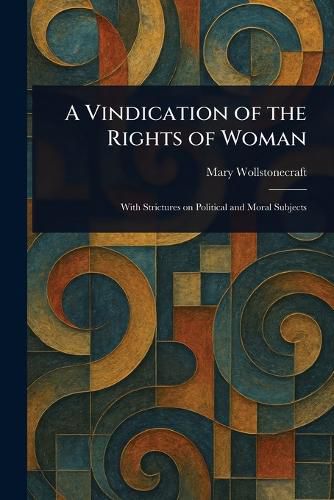Readings Newsletter
Become a Readings Member to make your shopping experience even easier.
Sign in or sign up for free!
You’re not far away from qualifying for FREE standard shipping within Australia
You’ve qualified for FREE standard shipping within Australia
The cart is loading…






This title is printed to order. This book may have been self-published. If so, we cannot guarantee the quality of the content. In the main most books will have gone through the editing process however some may not. We therefore suggest that you be aware of this before ordering this book. If in doubt check either the author or publisher’s details as we are unable to accept any returns unless they are faulty. Please contact us if you have any questions.
Mary Wollstonecraft's "A Vindication of the Rights of Woman" remains a cornerstone of feminist thought and a powerful call for social justice. Published in the late 18th century during the Enlightenment, this influential work challenged prevailing societal norms that relegated women to a secondary status.
Wollstonecraft argues passionately for the equality of the sexes, asserting that women are not inherently inferior to men, but rather lack the same opportunities for education and intellectual development. She advocates for women's rights to be recognized and respected, emphasizing the importance of reason and education in empowering women to become independent and contributing members of society.
This enduring work of political philosophy examines the historical context of women's roles in the 19th century, while its arguments for equality continue to resonate today. "A Vindication of the Rights of Woman" is essential reading for anyone interested in the history of feminism, women's rights, and the ongoing pursuit of a more just and equitable world.
This work has been selected by scholars as being culturally important, and is part of the knowledge base of civilization as we know it.
This work is in the public domain in the United States of America, and possibly other nations. Within the United States, you may freely copy and distribute this work, as no entity (individual or corporate) has a copyright on the body of the work.
Scholars believe, and we concur, that this work is important enough to be preserved, reproduced, and made generally available to the public. We appreciate your support of the preservation process, and thank you for being an important part of keeping this knowledge alive and relevant.
$9.00 standard shipping within Australia
FREE standard shipping within Australia for orders over $100.00
Express & International shipping calculated at checkout
This title is printed to order. This book may have been self-published. If so, we cannot guarantee the quality of the content. In the main most books will have gone through the editing process however some may not. We therefore suggest that you be aware of this before ordering this book. If in doubt check either the author or publisher’s details as we are unable to accept any returns unless they are faulty. Please contact us if you have any questions.
Mary Wollstonecraft's "A Vindication of the Rights of Woman" remains a cornerstone of feminist thought and a powerful call for social justice. Published in the late 18th century during the Enlightenment, this influential work challenged prevailing societal norms that relegated women to a secondary status.
Wollstonecraft argues passionately for the equality of the sexes, asserting that women are not inherently inferior to men, but rather lack the same opportunities for education and intellectual development. She advocates for women's rights to be recognized and respected, emphasizing the importance of reason and education in empowering women to become independent and contributing members of society.
This enduring work of political philosophy examines the historical context of women's roles in the 19th century, while its arguments for equality continue to resonate today. "A Vindication of the Rights of Woman" is essential reading for anyone interested in the history of feminism, women's rights, and the ongoing pursuit of a more just and equitable world.
This work has been selected by scholars as being culturally important, and is part of the knowledge base of civilization as we know it.
This work is in the public domain in the United States of America, and possibly other nations. Within the United States, you may freely copy and distribute this work, as no entity (individual or corporate) has a copyright on the body of the work.
Scholars believe, and we concur, that this work is important enough to be preserved, reproduced, and made generally available to the public. We appreciate your support of the preservation process, and thank you for being an important part of keeping this knowledge alive and relevant.